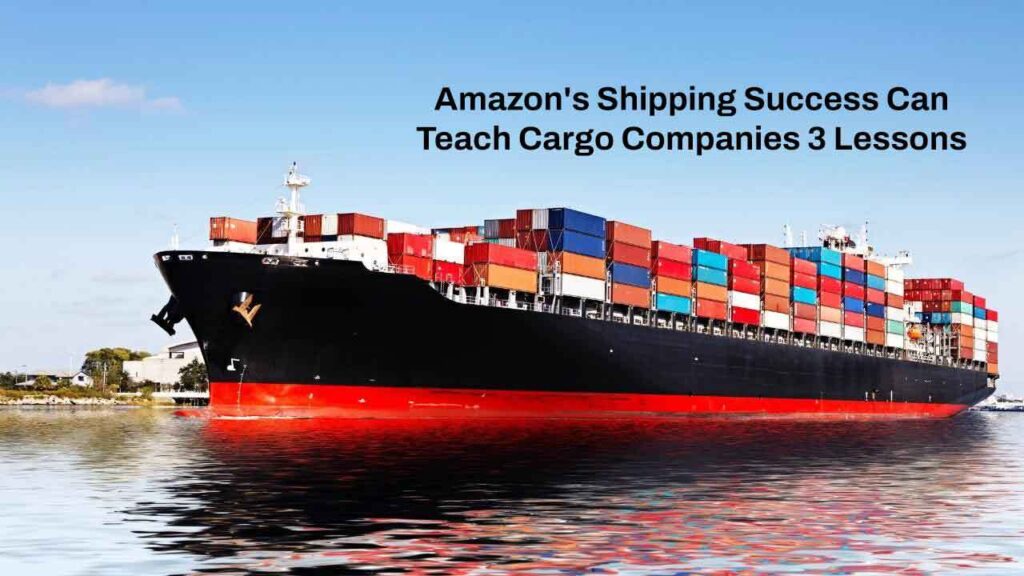The shipping troubles that plagued the second half of 2021 have continued into the new year. Global supply chains are still in a state of flux. Small-to-medium-sized shippers are left to deal with the consequences of jammed dockyards or an overabundance of empty containers.
Meanwhile, Amazon, one of the world’s largest corporations, continues to grow. It’s almost a carrier in and of itself, with its fleet of ships and planes and massive storage. Because of their size, they can neglect many shipping concerns that afflict smaller enterprises. That isn’t to say that other businesses can’t take inspiration from the megacorp. Smaller businesses who import or export items might draw three lessons from Amazon’s shipping success.
1. Make e-commerce a top priority.
E-commerce is expanding all over the world. Despite the fact that Amazon is the most popular online marketplace, it is far from the only one. Online platforms are now a component of practically every export transaction, thanks to the widespread use of e-commerce.
Other rapidly-growing internet markets, on the other hand, may offer intriguing cooperation prospects. Beyond keeping technologically relevant, digitizing your infrastructure has other advantages. Integration of an e-commerce platform, for example, provides for:
- To make your operations easier, you have a large number of third-party logistic service providers to choose from.
- While maintaining direct control and oversight of your inventories, you can outsource your warehouse.
- Integration with fulfillment firms to ship your products directly to your warehouses.
- Shipping and supply chain management, including customs and warehouse management, are tracked across several platforms.
The art of purchasing items will only become more computerized in the future. While this may provide difficulties for your business, incorporating technologies will streamline everything from dispatch to warehousing.
2. Focus on What You Can Control During the Global Supply Chain Crisis
These days, shipping is a bit of a disaster. Distribution is being disrupted all across the world due to international conflicts and supply chain concerns. In addition, the continuing pandemic is also causing issues. In Hong Kong, cargo flights have been halted due to deliberate violations of safety protocols.
When a few people can sabotage a whole week’s worth of cargo, you have to concentrate on what you can manage.
Make sure you keep track of your freight’s progress. You should be prepared to reroute your shipments to different locations if the dependability of ports throughout the world is questioned. Make sure your infrastructure is ready to accommodate shipments that have been diverted. Having a plan in place will help you avoid late delivery and losses. Furthermore, your things will not be trapped in a container the water
You should keep investing in digital warehouses and supply chain management as well. Because of its technological foundation, Amazon has weathered the majority of supply chain storms. The megacorp can still supply what its clients demand, from real-time information to bespoke shipment.
Why don’t you follow its lead? Consider the following:
- Collaborating with outside parties to offer updated parcel information, such as carriers or warehouse management.
- Working with vendors and manufacturers to develop supply and goods movement forecasts.
- To stay ahead of disruptions, Amazon business insights are being studied to detect resource mobility and purchasing habits.
- Much of the shipping business is still shaky, but Amazon’s sheer size and digital integration have kept it afloat. While small and medium shippers may not be able to take advantage of the same benefits, they can observe what Amazon and other major shippers do. They can also use the same strategies to control what they can.
3. Analytics and technology are required in all areas.
It’s difficult to complete the previous two sections of this article without a solid digital foundation. Shippers must be connected with the modern world in today’s environment.
Though all technology has a learning curve, the long-term benefits exceed the short-term drawbacks. Take a look at Amazon and how they manage their technology once more. They can anticipate everything thanks to modern automation and freight tracking. This includes the state of the water and any port closures. They can even keep track of a ship’s fuel levels while it’s on the go.
Although not every small and medium shipper will be able to use Amazon’s technology, there are a number of programs that are well within reach. To begin, technological developments are essential to maximize your warehouse’s use. Integrated and automated warehouse management systems Items can be moved from one region to another using storage systems. As a result, there are fewer human errors and more productivity (and available working hours).
Don’t forget about your numbers, either.
Turn your attention to data analysis in particular. Even third-party choices can assist your company in reaching its full potential. The study of shipping, warehouse, and supply chain data helps you to:
- At ports and warehouses, forecast shipment, spending, and traffic trends.
- Keep an eye on the vehicle’s diagnostics, location, and driving habits.
- To maximize shipping windows, research port times and schedules.
- Keep track of indicators related to warehouse capacity and storage to verify that your space is being used efficiently.
The importance of supply chain and shipping analytics will continue to rise. As the world continues to evolve, staying on top of these changes will become increasingly important. Predictive models and data analysis tools that use AI create roadmaps to help people navigate an unknown future.
Few organizations will ever be able to equal Amazon’s scale and scope. The retail and shipping behemoth, on the other hand, remains a hot topic for research. As the world’s supply lines continue to be disrupted, focus on what you can control. Take advantage of e-commerce partnership prospects by optimizing your digital platforms. Allow your numbers to be driven by data analysis.
The world of tomorrow will be digital, and shipping corporations, like Amazon, will benefit from responding to these new changes. Changes are inevitable but the roots remain intact. To know more about the roots and rules of shipping and how the freight shipping company works JMY Cargo is your go-to confidant.

